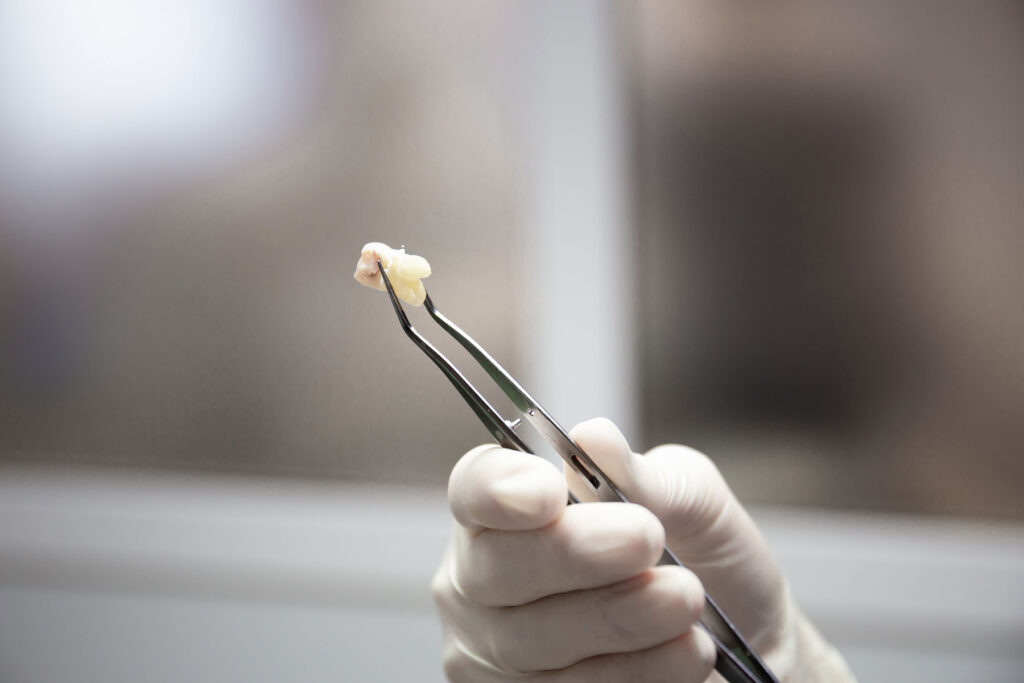There are a mouthful of things to know about getting a tooth extraction, if you’ll pardon the pun. Tooth extractions are standard dental procedures performed daily on hundreds of patients. Such things can be daunting to think about. But knowledge is power. Understanding the process and what measures you can take to ensure a smooth recovery can go a long way toward relieving pre-procedure anxiety.
So what can you expect from dental extractions? Before we get into that, don’t forget that you live in modern times with access to state-of-the-art medical care. You are in the hands of professionals who have done this countless times. Better to have a tooth extracted now than a tooth pulled a century ago. The empathetic, skilled staff of Dental Designs of Maryland – White Marsh, MD, is dedicated to making your tooth extraction process as easy and painless as possible. Call 410.834.4284 for more information today.
5 Things to Know About Tooth Extractions
What to know about tooth extraction? That is the question, and your best bet is to ask your dentist or oral surgeon as many questions as possible. However, most professionals will thoroughly explain the extraction and healing process beforehand.
1. Types of Tooth Extractions
The complexities of a tooth extraction procedure depend on several factors, including the condition of the tooth itself. Tooth extractions are classified into two categories:
Simple Extraction
Simple pulls, when the whole tooth is visible in the mouth and can be extracted at once, are easier than procedures where the tooth’s remnants must be surgically removed from the gums. Dentists, as opposed to oral surgeons, usually carry out simple extractions using local anesthesia to numb the area. They use tools like elevators and forceps to numb the area before removing the tooth.
Surgical Extraction
This is a more complex procedure used for teeth that are not easily accessible, like impacted wisdom teeth that are thoroughly or partially hidden in the gums. Removing these involves making an incision in the gum to remove the tooth. Surgical extractions are often performed by oral surgeons under local anesthesia or sedation
These procedures might sound intimidating. But remember that every extraction will always be pain-free. Your dentist or oral surgeon will ensure areas are thoroughly numb before any work begins. Though some post-procedure discomfort can be expected, it will be minimal and manageable if pain medications are taken as prescribed.
2. Preparing for Your Tooth Extraction
Before your tooth extraction procedure, your dentist will ask for a detailed medical history and take X-rays to assess your tooth’s position and condition. Inform your dentist about any medications or supplements you are taking or health conditions you might have, as some may affect the procedure and healing process. Eating a healthy meal beforehand is recommended unless you are receiving general anesthesia, in which case you must fast. At Dental Designs of Maryland – White Marsh, MD, our staff will ensure you get a comprehensive treatment plan.
3. Post-Extraction Care
Proper care after extraction is vital to avoid complications like dry sockets, infections, or prolonged healing. Some critical tips include:
- Do – Apply ice packs to reduce swelling, eat soft foods, and follow your dentist’s cleaning instructions
- Don’t – Smoke, use a straw, or spit vigorously for at least 24-48 hours (about two days) after the extraction to avoid dislodging the blood clot from the socket
- Do – Discuss effective pain management with your dentist or oral surgeon. They may recommend over-the-counter pain relievers or prescribe medication, depending on the extraction’s difficulty
While you can run errands and go about necessary activities while healing, remember to keep things simple and non-strenuous. Rest and adherence to post-procedure instructions are the most critical considerations in the hours immediately following your extraction.
4. The Healing Process: How Long Does a Tooth Extraction Take to Heal?
The initial healing period, where the gum tissue starts closing over the extraction site, takes about one to two weeks. However, it can take three to four weeks for the area to heal fully. Bone remodeling, where the bone structures re-form in the extraction site, can take several months. Proper post-operation care is crucial for speeding up the recovery process and minimizing complications.
5. Knowing When to Seek Further Help
While some discomfort and swelling are normal after an extraction, some signs may indicate complications. Contact your dentist if you experience severe pain, excessive bleeding, signs of infection such as fever and pus, or any other concerning symptoms in the days following your procedure.
Tooth extraction can be necessary for assorted reasons, including decay, injury, or preparation for orthodontic treatment. Always follow your dentist’s instructions, and don’t hesitate to contact your provider with any concerns during your recovery.
Call Dental Designs of Maryland – White Marsh, MD to Schedule an Appointment Today
Having excellent dental health will drastically improve your quality of life. Caring professionals who understand and empathize with the needs and concerns of patients make all the difference. A great bedside manner combined with expert treatment is something to smile about. Schedule an appointment online at Dental Designs of Maryland – White Marsh, MD, or call us at 410.834.4284 today.


